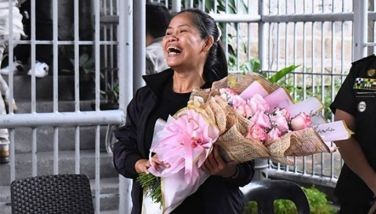Gov’t urges Pinoys in Iraq to come home
MANILA, Philippines - Filipinos in Iraq were again asked to come home for their own welfare and safety.
Presidential Communications Operations Office Secretary Herminio Coloma Jr. said Filipinos must heed the government’s advisory on mandatory evacuation.
Filipinos in Iraq must be ready for repatriation, he added.
Coloma said the Department of Foreign Affairs (DFA) had raised to Level 4 the crisis alert requiring mandatory repatriation from danger zones except Kurdistan.
“The government will undertake mandatory evacuation procedures and the DFA’s Rapid Response Team is currently carrying out registration of Filipinos in Iraq for repatriation,†he said.
Vice President Jejomar Binay urged overseas Filipino workers (OFWs) in Iraq to heed the DFA’s mandatory evacuation order.
The presidential adviser on OFW concerns said the situation in that country is no longer safe.
“I call on our kababayans in Iraq to please proceed to the Philippine embassy in Baghdad so that repatriation procedures can be initiated as soon as possible,†he said.
Binay also called on recruitment agencies that have deployed OFWs in Iraq to assist in their repatriation.
About 900 Filipinos are in Iraq: some 154 in Baghdad and the rest in Kurdistan.
On Thursday, the DFA raised Alert Level 4 in all areas in Iraq, except in Kurdistan, which remains under alert level 1.
The Philippine Overseas Employment Administration (POEA) has banned the deployment of OFWs in Iraq, except in Kurdistan.
Most OFWs in Iraq are documented since the government lifted the deployment ban last year, the POEA added.
Filipinos in Iraq may contact the Philippine embassy in Baghdad at +964-7817889761, +964-7715187510, +964-7712351127, +964-7714709842, and +964-7715807201. Embassy officials may also be sent an email at [email protected] and [email protected].
The DFA has opened a 24-hour hotline for families of OFWs in Libya and Iraq.
Those who have questions and concerns about the condition of their relatives in Iraq and Libya can call the hotline numbers (02) 552-7105 or (02) 834-4685.
Families may also send their queries by e-mail to [email protected].
Libya has been placed under Crisis Alert Level 3 (Voluntary Repatriation) since May 29.
Filipinos in Libya wishing to volunteer for repatriation may contact the Philippine embassy in Tripoli at KM 7 Gargaresh Road, Abu Nawas.
They can also get in touch with the embassy through telephone numbers (00218) 918-244-208 / (00218) 911061166, or e-mail [email protected] and [email protected].
Filipinos in Iraq are urged to contact the Philippine embassy in Baghdad and register for repatriation.
The embassy is on Hay Al-Jamia, Mahalat 915, Zukak 22, House No. 4 and 4/1, Jadriyah, Baghdad.
Filipinos can get in touch with the embassy through telephone no. 00-964-7715807201 or email [email protected], [email protected].
Diseases in Iraq
The World Health Organization (WHO) has warned of possible spread of measles, polio and other diseases in war-torn Iraq.
“Immediate and critical health risks of concern include the spread of measles, which is endemic in Mosul and could potentially lead to outbreaks, especially in overcrowded areas where internally displaced persons are located,†the WHO said.
“The spread of polio is also a high risk as new cases were reported in the country earlier this year as a result of the Syria crisis.â€
The WHO said the risk of waterborne diseases like acute watery diarrhea might rise as the crisis is likely to interrupt water and sanitation services.
The humanitarian situation in Iraq has deteriorated dramatically in the last few days, especially in the regions of Ninewa, Salaheddin and Diyala provinces, the WHO added.
The WHO said more than 500,000 people are estimated to have fled their homes in Mosul and surrounding areas.
An estimated 100,000 have entered Erbil and 200,000 fled to Dohuk, the WHO added.
Almost 25,000 people are seeking shelter in schools and mosques in Mosul City.
Many have no access to drinking water, as the main water station was destroyed by bombing, and food shortages are being reported.
The WHO said hundreds of thousands more are stranded at checkpoints as the fighting continues.
They have no belongings or money for housing, food, water or medical care, WHO added.
Accurate figures of casualties are unavailable but stand in the hundreds.
The WHO is working with local and international partners in Iraq to meet the urgent health needs of the evacuees.
It has strengthened its disease early warning alert and response system in Kurdistan and Mosul.
It will soon launch emergency polio and measles vaccination activities for internally displaced persons with the directorates of health in Dohuk and Erbil.
A team from WHO is currently on the ground assessing the risk of epidemics in affected areas. It will ensure that systems are in place to rapidly respond and contain disease outbreaks.
Migrante International has called on the government to bare its plans for possible massive repatriation of OFWs from Iraq and Libya. – Aurea Calica, Jose Rodel Clapano, Mayen Jaymalin, Helen Flores
- Latest
- Trending




























